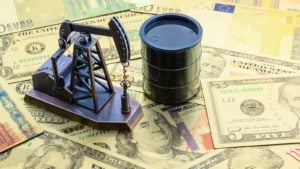The coronavirus pandemic is creating changes to the global economy that can make you seem like you’re living through a movie. Businesses are closed not due to lack of demand, but because supply was cut off. And that is causing more problems for some troubled stocks.
Millions of Americans are under shelter in place orders. Not surprisingly, the idea that “the cure is worse than the disease” is creating a strong movement towards having the economy reopen.
But when the economy does reopen, one thing seem clear, it won’t be business as usual. And given the razor-thin margins some businesses run on, government assistance may not be sufficient for some to survive.
That’s a thought that is echoed by Dr. John Griffin, Professor of Finance for the McCombs School of Business at the University of Texas at Austin. In an email response to InvestorPlace, Griffin said of the federal bailouts:
“I do not think that the federal bailouts will matter much for an impending recession/depression. People won’t eat at restaurants, take trips, or do many of things they do until COVID-19 is under control. So the economy will continue to contract.”
A few troubled stocks that come to mind include:
Many companies were ill prepared for a recession that just three months ago was thought to be 12-18 months away. And that means, despite the injection of direct stimulus by the federal government, some companies won’t survive the impact of the coronavirus.
J.C. Penney (JCP)

J.C. Penney is an iconic name from the golden age of retail shopping. However, unlike other department store chains, J.C. Penney is lagging behind other department stores with regard to its e-commerce presence. According to Bloomberg Senior Retail Analyst Poonam Goyal, the majority of J.C. Penney’s business comes from brick-and-mortar sales.
But the pandemic has forced the department store chain to close all its stores. And whenever we see a “phased in” reopening, it’s not hard to imagine that department stores like Penney’s will be seen as serving an essential need.
According to Goyal, if the company is able to open late in the second quarter, Bloomberg projects that the company will lose 35% in annual sales in 2020. However, if the pandemic becomes worse and stores stay closed for the remainder of the year, the company stands to lose 71% in sales.
The pandemic is disrupting a turnaround plan that already needed a lot to go perfectly. The company skipped a $12 million interest payment in mid-April. That’s led to speculation that bankruptcy may be coming sooner rather than later.
And bankruptcy is the last thing that JCP stock needs. The stock is down over 70% in 2020 and is well below the $1 mark. If the company cannot reverse its fortunes, it most assuredly will be de-listed.
Frontier Communications (FTR)

Frontier Communications stock continues to fall, even as the company embarks on a restructuring plan. As part of the restructuring, Frontier filed for a Chapter 11 bankruptcy on April 14. There is no question that Frontier is taking a proper step to lower its existing debt. However, analysts are still skeptical of the company’s ability to execute the plan in a post-Coronavirus environment.
Frontier’s decline began with its 2016 purchase of Verizon’s (NYSE:VZ) wire line business in three states. In its bankruptcy petition, Frontier cites the emergence of fiber as a superior alternative to historic copper networks as one reason for its misfortune. However, the petition also claims that its CEO Dan McCarthy failed to extract profits from the fiber optic service (FiOS) networks that it received in the Verizon deal.
That’s resulted in Frontier’s revenue dropping for the last 14 consecutive quarters. In 13 of those quarters, the company also posted negative earnings per share (EPS). This might be understandable if Frontier was a startup company. It’s not. And the company is showing an eroding customer base.
Prior to announcing its restructuring plan, Frontier announced plans to sell operations and assets in Washington, Oregon, Idaho, and Montana.
Chaparral Energy (CHAP)

On the one hand, it’s almost too easy to put an oil stock on this list. And with its stock down nearly 80% in 2020, Chaparral Energy certainly qualifies. However, the last time the country had an oil shock, Chaparral filed for and successfully exited a Chapter 11 bankruptcy. History may be repeating itself.
This is despite the fact that the company’s CEO, K. Earl Reynolds, purchased 7,100 shares of CHAP stock in late March. In its most recent earnings report in March, CHAP beat analysts’ expectations for both revenue and earnings.
But that most certainly did not factor in the current state of the oil market. Despite the earnings beat, Roth Capital downgraded the stock from “Buy” to “Neutral.” In late March, the company announced it had hired financial advisors to help it improve its balance sheet.
The company has $421 million in outstanding debt. It has 8.75% bonds due in July 2023 that are currently trading at 25 cents on the dollar. The company says no restructuring move is imminent.
The bottom line for Chaparral is that it needs to see oil prices recover to stave off what appears to be an inevitable move into another bankruptcy. However despite the United States government direct intervention with Saudi Arabia, the price of oil is still reaching for a bottom.
As of this writing, Chris Markoch did not hold a position in any of the aforementioned securities.
